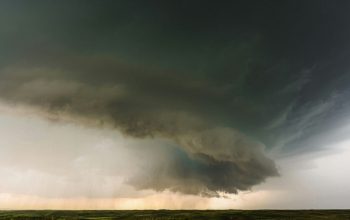Last month, on March 5th a series of deadly tornadoes struck Madison County, Iowa, and the town of Winterset. It left a path of destruction which earned it classification as an EF4 tornado, the second worst designation behind the so-called “finger of God”, the EF5. The first such storm since 2013. And with winds howling at a peak speed of 170 miles per hour, swirling in a funnel over 800 yards – or 8 football fields – in width at it’s largest, the tornado that struck Winterset was a monster that took six lives and injured five others in a matter of seconds.
Speaking of seconds, the people in the path of the tornado lost at least 420 of them just when every single one counted most, due to a malfunction of the National Weather System’s outdated communications infrastructure. Now Iowa’s lawmakers in the nation’s capital, both Republicans and Democrats, are working together to lead the effort to upgrade the nation’s weather alert system in order to prevent future tragedies like the one that befell Hollywood icon John Wayne’s hometown.
Days after the storm, Rep. Ashley Hinson (R-IA) and Rep. Cindy Axne (D-IA) sent a letter to the National Weather Service seeking information as to why the NWS communications system, called NWS Chat, had malfunctioned during the tragic tornadoes.
“This is not the first time that the NWS has malfunctioned during severe weather events. There have been several reports of delays, including the inability to communicate over NWS Chat when severe weather strikes” the letter stated. “Every minute counts for saving lives, preventing injury, and mitigating property damage when severe weather strikes. As storms become increasingly unpredictable, quick and accurate weather alerts become even more critical.”
In the other chamber of Congress, Iowa’s two Senators Joni Ernst and Chuck Grassley, both Republicans, introduced the TORNADO Act, which would test the effectiveness of weather alert systems, and require NOAA (the National Oceanic and Atmospheric Administration) to develop an action plan for better tornado forecasting and prediction, and encorages NOAA to consider changes to the current tornado rating system.
“It’s critical we do everything we can, as quickly as we can, to protect and keep our communities safe from these disastrous weather events,” said Ernst in a statement. “When it comes to keeping Iowans safe from severe weather and tornadoes, every second counts,” Grassley said. “Our bill will ensure NOAA is taking necessary steps to streamline life-saving alert systems and keeping their communication equipment up-to-date. One life lost is one too many, and I continue praying for those who lost loved ones in the recent tornado outbreak in Iowa. We must act to minimize these tragedies moving forward.”
Now Rep. Randy Feenstra (R-IA) has introduced the National Weather Service Communications Improvement Act. The act, which would direct the director of the National Weather Service to select a commercial alternative to the outdated NWS chat which would prioritize reliability and security. The bill enjoys bipartisan support from within and outside of the Iowa delegation, with a list of cosponsors that includesRep. Cindy Axne (D-IA), Rep. Mariannette Miller-Meeks (R-IA), Rep. Ashley Hinson (R-IA), and Rep. Carlos Gimenez (R-FL).
“As an on-air reporter, I saw first-hand how important timely alerts are during severe weather – every second counts for saving lives,” said Rep. Hinson. “I’m proud to work across the aisle to help modernize the NWS chat system to ensure Iowans have the information they need to stay safe when severe weather strikes.”
“During a severe weather event, every second matters, and ensuring the National Weather Service has the resources they need to modernize their communications has the potential to save lives,” said Rep. Axne. “While more work may need to be done, this bill will bring us one step closer to preventing further communication issues and ensuring that Iowans have the critical information they need to protect themselves, their families, and their property.”
“In early March, South Central Iowa saw the deadliest storm to hit our state in more than a decade. The storm ravaged communities like Chariton in my district, leaving many without homes, power, and access to water,” said Rep. Miller-Meeks. “We need to make sure that the Weather Service has all the tools they need to support communities across the U.S. and help them prepare for potentially disastrous storms. I am proud to partner with the entire Iowa delegation to support our state and better prepare for future tornadoes.”
“The National Weather Service must have a functional and reliable emergency communications system that keeps people informed and out of harm’s way during severe storms,” said Rep. Feenstra. “For too long, NWS Chat has failed our broadcasters, emergency response teams, and the general public. This bipartisan legislation will finally ensure that local officials and emergency personnel receive accurate, timely information that saves lives.”
The city of Eagle Grove and much of Wright County were also impacted by severe weather within the past year, during the December 15, 2021 derecho. The Derecho damaged homes and properties in Eagle Grove and the surrounding community, with some structures being obliterated and mobile homes and semi trucks tossed about like toys. In addition to the inland hurricane force winds of the derecho, that storm also spawned 63 tornadoes.
The EF4 tornado that devastated Winterset on March 5th traveled a total of 69.5 miles on the ground, two thirds of the distance between Winterset and Eagle Grove. Clocked traveling at a speed of about 170 miles per hour, the tornado could have reached Eagle Grove from Winterset in just over half an hour.
Email news@eaglegroveeagle.com with your tips, corrections, and suggestions.







